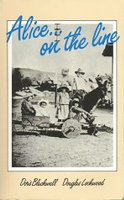Alice On the Line by Doris Blackwell was one of the books carried at the Alice Springs Telegraph Station for tourists interested in more history. I picked it up shortly after I started working there. I figured I needed to know more about the place, since I was selling tickets to get inside.
 This autobiography is the fascinating story of a young woman living at the Telegraph Station during its early days. Like Doris’ father, I found myself in Alice Springs because of a job offer. Like Doris, I came to love this small town in the middle of the continent.
This autobiography is the fascinating story of a young woman living at the Telegraph Station during its early days. Like Doris’ father, I found myself in Alice Springs because of a job offer. Like Doris, I came to love this small town in the middle of the continent.
This post contains affiliate links; as an Amazon associate, I earn from qualifying purchases.
Alice… on the Line summary
Alice… On the Line is a coming-of-age story for both Doris Blackwell and the Telegraph Station. In 1899, Doris’ father takes the job as the new officer-in-charge at Alice Springs, which wasn’t even on the map. To get there, her family catches the train from Adelaide to Oodnadatta and then transfers to a buggy for a very bouncy, uncomfortable ride to Alice Springs.
Unlike their trip, mine took an effortless three and a half hours by plane from Sydney. While they had days to anticipate their arrival in Alice, I found myself blinking in shock when I stepped off the plane into a flat, red world. Even the airport terminal squatted behind the faded green bushes, making me wonder if the pilot had landed in the wrong place.
Doris Blackwell was eight when she arrived in Alice Springs—young enough to be excited about a new home, yet old enough to be “aware that my friends were beyond reach and would remain so for a longer time than I’d already lived.”
Originally, the town was called Stuart, after the first explorer. The Telegraph Station was then two miles distant from town. When Doris’ family arrived, Stuart consisted of “one hotel, two stores, three houses.” She notes, “I suppose our arrival was the biggest event in Alice Springs for some months, perhaps for years . . . after all, it isn’t every day that the arrival of one family increases a town’s population by fifty per cent.”
The Telegraph Station was larger than the nearby town, consisting of “nine main stone buildings, with two or three smaller ones, all huddled together in a compact group.” Doris’ father oversaw four operators, plus the linemen, stockman, and a cook. Her mother had a governess to teach the children and two Aborigine women to help around the house. Doris speaks fondly of these people, relaying stories about interactions between the white and black communities there.
My thoughts on Doris Blackwell’s Autobiography
Doris Blackwell’s descriptions of Alice Springs and the Telegraph Station bring a lump to my throat when I read because I saw the places she described. Her father tells her, shortly before she arrives there, that
“It’s a beautiful place, set inside a range of mountains, with a river bed running through it, and big ghost gums growing everywhere. You’ll like it.”
I climbed that mountain range, hiked along that river bed, took pictures of the ghost gums. Even though I came from “the Prairies” of Canada, I found that the “vastness and the never-ending immensity of [the desert] baffled the imagination. I’d had no concept that anything in the world, not even the sea, could be so literally ‘big.’”
Doris spent nine years in Alice Springs, including on trip back to Adelaide in 1905. Alice… on the Line includes black and white pictures of the people and places she talks about. She wrote her memoir sixty years later, saying that her memories of that time are “vivid, detached and sharp.” Like Mrs. Gunn in We of the Never-Never, she fell under “the spell of the Inland, the relentless country that has to be understood before it can be tamed.”
Her words show her love for Alice Springs, the people there, and the telegraph line that spanned Australia. Alice on the Line made me proud to be part of that for the month I spent there.
In the early pages of the book, Doris’ father says,
“Here you will find a wonderland of chasms and gorges and valleys that are as dramatic as anything I have seen. I wouldn’t be surprised if, one day, this becomes a great tourist centre.”
I was one of the many tourists he predicted would come. Like Doris Blackwell, I find my memories of Alice are among my most sharp and vivid memories of the summer I spent in Australia.

No Responses Yet